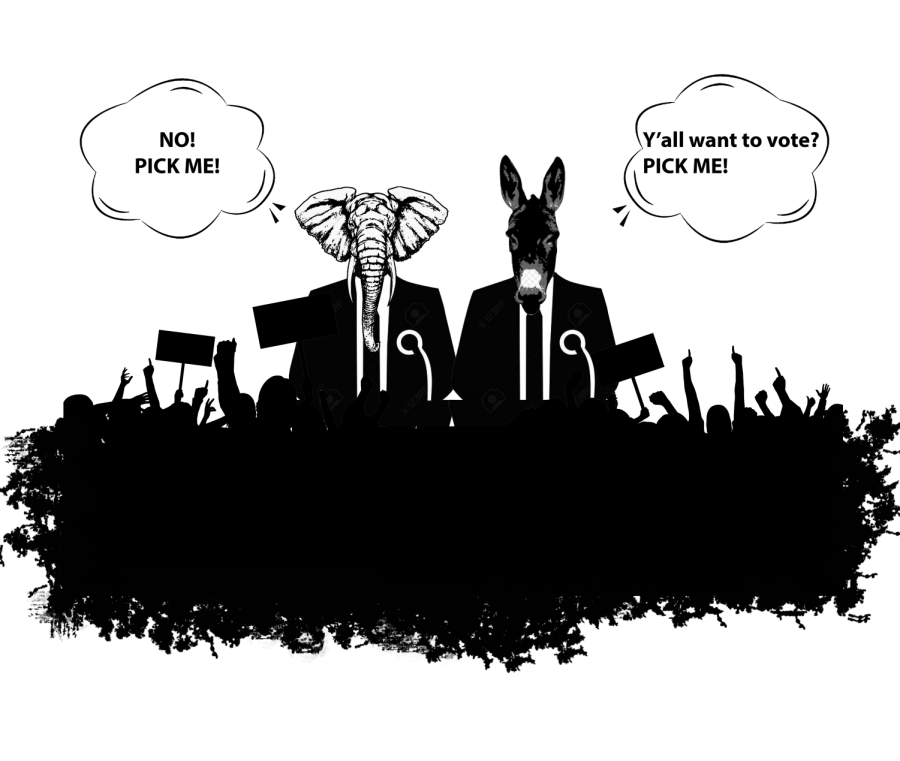Cushman: Party-Run Primaries Present Problems
November 6, 2019
Faith in American institutions has been on a decline since 1958, when the National Election Study first began polling about trust in the government. The amount of Americans who believe they can trust their government to do what is right “just about always” or “most of the time” has not reached above 30% since 2007. In 2019, the number wavers at 17%. I believe that much of this mistrust in government is a result of the erosion of democratic institutions in the United States. As we approach another election season and another packed primary (this time from the Democrats), I cannot help but feel a little disillusioned myself. Our primary system, the way parties choose which candidate will represent them in the presidential election, is fundamentally broken and does not reflect the will of the people.
Closed Primaries
Primaries, while technically an official election, are not final. They are run by parties, not the government, and thus do not operate by the same rules. Instead of functioning on a system of one vote per person, universal suffrage and other rules guaranteeing free and fair elections, parties get to operate their primaries by whichever rules they set. One example of these rules set by the primaries can be seen with the superdelegates of the Democratic party. Superdelegates are important members of the Democratic party who, up until a policy change in 2018, had votes worth 10,000 of the ordinary citizen’s vote. Perhaps one of the biggest affronts towards free and fair elections that parties use are closed primaries. An open primary means that regardless of party affiliation, anyone can vote in that primary. Closed primaries, however, exclude anyone who is not affiliated with the party hosting the primary.
There has long been justification for this. Democrats do not want Republicans influencing who their candidate is and Republicans do not want Democrats influencing theirs. This method of exclusion, however, affects people who identify as independent the most. Not every state has closed primaries for either or both of the major parties, but in states with closed primaries for both the Republicans and Democrats, independents can be completely excluded from participation in the primary season. In 2017, 42% of Americans identified as independents. There is no other way to put it — to potentially exclude that many people from one or both primary elections is simply undemocratic.
Furthermore, closed primaries pressure people to affiliate with parties that they do not necessarily align with. In Utah, only the Republican primary is closed. If everyone registered as a Republican, they could vote in both primaries. That in itself is a problem. People who want to remain politically independent or who want to affiliate as a Democrat shouldn’t be pressured to register as a Republican for the sake of getting a vote. In a good democracy, voting isn’t only a right we have, but a right that is easy to exercise. Having to list yourself as a party you do not align with is an undue burden on your right to have a voice.
Cancelled Primaries
In 2020, five states, Alaska, Arizona, South Carolina, Nevada and Kansas have announced that they are not going to hold Republican primaries. While it sounds scary, this is not the first election in which the party with the sitting incumbent has canceled some primaries. Arizona canceled the Democratic primary in 2012, when Obama was the sitting incumbent and in 1996 when Bill Clinton was seeking reelection. In 2004, 10 primaries were canceled by the Republican party when George W. Bush was running for reelection. Just because it has precedent on both sides of the aisle, however, does not mean that it is right. One of the principles integral to democracy is the ability to take leaders out of office. If in 2020, the American people want a candidate with Republican principles but not the Republican incumbent, the primary season is the only time they can vote to show that. Canceling primaries places restrictions on the voice of the American people and their ability to choose a leader who can best represent their interests.
Power to the Party?
Ultimately, these issues with our primary system can be boiled down to one thing — the rights of the American people are not being taken as seriously as the rights of political parties. The Supreme Court, in California Democratic Party v. Jones, affirmed the right of political parties to hold closed primaries, saying that limiting their ability to do so was a violation of the party’s right of association. Rather than being treated as an integral part of this country’s political and electoral process by the Supreme Court, parties are treated as apolitical and are granted the same rights as American citizens. In a country that is meant to be by and for the people, however, it is frustrating to see the right of a political party to associate freely being held in the same esteem as my right, the people’s right to vote.








